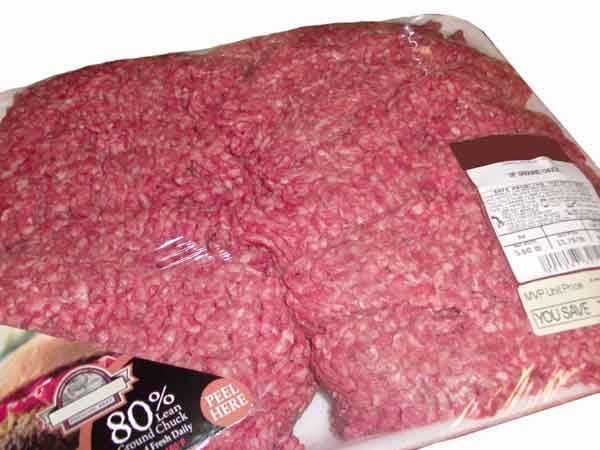It almost makes me want to be a vegetarian.
Stories in last Sunday’s newspaper went into exquisite detail about the recall of ground beef sold by Hannaford after a number of people got sick with a drug-resistant strain of Salmonella.
People began getting sick in early October. Up to 20 people were infected; eight were hospitalized. One, Danielle Wadsworth, from Lewiston, spent three days in the hospital after eating tacos made by her boyfriend on Oct. 30. She lost two weeks of work.
Hannaford didn’t start recalling the tainted burger until Dec. 15, when U.S. Department of Agriculture Food Safety and Inspection Service officials showed up at Hannaford distribution centers in Maine and New York. That’s roughly two months after the first person got sick.
Most of the story focused on Hannaford’s record-keeping, or lack thereof. It seems that when beef arrives at the stores, it comes in large tubes of roughly ground beef. This is ground into finer hamburger and then combined with ground up trimmings from prime cuts. “Trim” may also include “pink slime,” ammonia-treated offal that has been in the news recently.
Records are kept at the grinder showing where the coarse-cut meat comes from, but there were no corresponding records about where the trim came from. Worse, grinders were not cleaning the equipment from one batch to the next, so it was impossible to know for sure which might have been infected.
Hannaford has since mended its ways, now keeping track of each kind of meat and washing its grinders. If there were another contamination, Hannaford should be able to determine its source and go after the supplier.
That protects Hannaford. It does not protect the consumers, who are just as likely to get sick now as they were in October. There was nothing in the story about how we can stop contaminated food from getting on supermarket shelves in the first place.
And, in the scheme of things, this was just a tiny event. Every year, the story said, 48 million Americans get sick from contaminated food; 128,000 are hospitalized, and 3,000 die. The particular type of salmonella that infected Hannaford beef sickens about 1 million Americans each year, of which 19,336 are hospitalized and 378 die.
Meat production in the U.S. — beef, pork, chicken — is pretty much industrialized. Large numbers of animals are confined in small spaces, fed antibiotics and feed that make them grow faster. Their brief unhappy lives end in assembly line slaughterhouses. Their parts are shipped all over the country. And, in the case of beef and chicken, their final packaging is given a dose of carbon monoxide to keep it looking fresh.
I’m not a vegetarian, not yet, but I haven’t bought an ounce of meat at a supermarket in 10 years. Why gamble with your health? Here’s how to stay away from industrial meat:
* Raise your own chickens. I’ve got 50 layers, but anyone can start smaller. The eggs are great, and when the layers get to three years or so, they go in the freezer, They make the best stews and soups, but don’t try to fry or bake.
* Buy a whole pig from a neighbor who raises them or buy from someone who sells by the half or quarter. Nearby Foggy Moon Farm — Tom and Judy Abbott — was my last source of sausage and bacon.
* Raise your own beef, or buy a side from someone who does. I’ve done both, and this year my major supplier is Oaklands Farm in Gardiner, where Logan Johnston and Phyllis Gardiner raise grass-fed beef.
* Try other meats. I was surprised at the good taste and texture of goat meat the first time I tried it. Moose and venison occasionally come my way. Dragon Fly Farm in Dresden produces great-tasting pepperoni and chorizzo sausage from goat meat.
* Stay far away from junk food restaurants. All they have is industrial meat. They are a big reason why our meat industry is in its current unhealthy state.
* Do without. It hasn’t killed me to not have a daily ration of beef, chicken, or pork. Last week, most of my meals were from vegetables grown on this farm.
No one forces us to buy industrial meat. We volunteer for it and then we sue everyone in sight after we get sick.
That’s not what good food, or good health, is all about.
Denis Thoet owns and manages Long Meadow Farm in West Gardiner. www.long meadowfarmmaine.com.
Send questions/comments to the editors.



Success. Please wait for the page to reload. If the page does not reload within 5 seconds, please refresh the page.
Enter your email and password to access comments.
Hi, to comment on stories you must . This profile is in addition to your subscription and website login.
Already have a commenting profile? .
Invalid username/password.
Please check your email to confirm and complete your registration.
Only subscribers are eligible to post comments. Please subscribe or login first for digital access. Here’s why.
Use the form below to reset your password. When you've submitted your account email, we will send an email with a reset code.